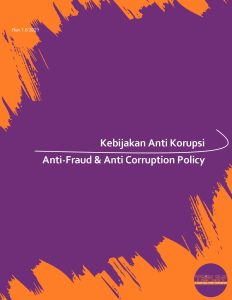 TRIPLE-F has a zero-tolerance policy towards fraud and corruption. We recognise that we work in a challenging context both in Indonesia and overseas where there are risks of fraud and corruption. We address this danger by conducting a thorough risk analysis of our projects and by implementing our Anti-Fraud & Anti-Corruption Policy throughout our operational procedures. The policy aims to: (1) Ensure that financial and other resources are used solely for the intended purposes. (2) Promote a culture of honesty and openness among the staff and management of TRIPLE-F. (3) Ensure that vulnerable populations are not disadvantaged or exploited by staff members or their associates who commit fraudulent and corrupt acts; and (4) Assure members of staff and target populations that they can safely and confidently raise and report all serious concerns about unethical conduct, suspected fraud and corruption. This Policy applies to all TRIPLE-F employees (full time, part time, temporary and casual) and also to non-TRIPLE-F implementing partners who access funds from TRIPLE-F through the TRIPLE-F funding mechanisms. The policy covers all bona fide concerns raised relating to the following: (a) Financial misconduct, including criminal acts such as theft of cash and false accounting thereof. (b) Abuse of resources which belong to TRIPLE-F and those provided by, or purchased using funds raised by TRIPLE-F. Abuse of resources can include theft and computer crimes where a computer or network is the source, tool, target, or place of a crime (e.g., unauthorised access, suppression of data, electronic fraud, etc). (c) Use of improper means, such as bribery, kickbacks or so-called ‘facilitation’ payments, by someone to induce another person to act or to refrain from acting in the exercise of her/his duties, in order to obtain or retain an undue advantage. (d) Any action or omission, including misrepresentation, that knowingly or recklessly misleads, or attempts to mislead, a party to obtain a financial or other benefit or to avoid an obligation. (e) Threatened or actual illegal actions such as personal injury or damage to property, in order to obtain an undue advantage or to avoid an obligation. (f) Collusion in improper procurement or contracting activities. (g) Any attempts to suppress or conceal any of the above
TRIPLE-F has a zero-tolerance policy towards fraud and corruption. We recognise that we work in a challenging context both in Indonesia and overseas where there are risks of fraud and corruption. We address this danger by conducting a thorough risk analysis of our projects and by implementing our Anti-Fraud & Anti-Corruption Policy throughout our operational procedures. The policy aims to: (1) Ensure that financial and other resources are used solely for the intended purposes. (2) Promote a culture of honesty and openness among the staff and management of TRIPLE-F. (3) Ensure that vulnerable populations are not disadvantaged or exploited by staff members or their associates who commit fraudulent and corrupt acts; and (4) Assure members of staff and target populations that they can safely and confidently raise and report all serious concerns about unethical conduct, suspected fraud and corruption. This Policy applies to all TRIPLE-F employees (full time, part time, temporary and casual) and also to non-TRIPLE-F implementing partners who access funds from TRIPLE-F through the TRIPLE-F funding mechanisms. The policy covers all bona fide concerns raised relating to the following: (a) Financial misconduct, including criminal acts such as theft of cash and false accounting thereof. (b) Abuse of resources which belong to TRIPLE-F and those provided by, or purchased using funds raised by TRIPLE-F. Abuse of resources can include theft and computer crimes where a computer or network is the source, tool, target, or place of a crime (e.g., unauthorised access, suppression of data, electronic fraud, etc). (c) Use of improper means, such as bribery, kickbacks or so-called ‘facilitation’ payments, by someone to induce another person to act or to refrain from acting in the exercise of her/his duties, in order to obtain or retain an undue advantage. (d) Any action or omission, including misrepresentation, that knowingly or recklessly misleads, or attempts to mislead, a party to obtain a financial or other benefit or to avoid an obligation. (e) Threatened or actual illegal actions such as personal injury or damage to property, in order to obtain an undue advantage or to avoid an obligation. (f) Collusion in improper procurement or contracting activities. (g) Any attempts to suppress or conceal any of the above